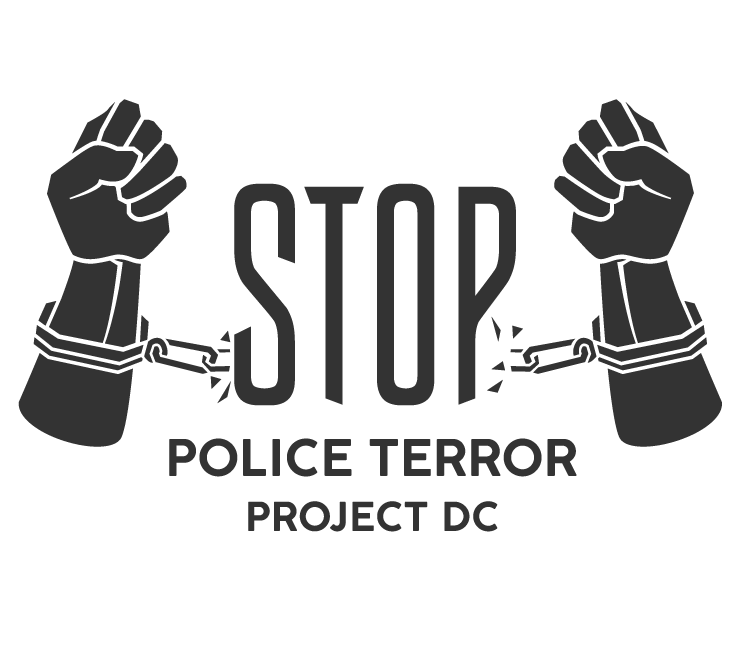PRESS RELEASE: BLM-DC and SPTP-DC Agree to Dismissal of NEAR Act Case, Call on Council to Ban Stop-and-Frisk
FOR IMMEDIATE RELEASE
Thursday October 3, 2019
Media Contacts:
April Goggans, BLM-DC
(202) 250-4541
Valerie Wexler, SPTP-DC
(202) 505-4699
info@sptdc.com
After MPD Releases Data BLM-DC and SPTP-DC Agree to Dismissal of NEAR Act Case
Black Lives Matter DC and Stop Police Terror DC Call on DC Government to Take the Next Step to Protect Black Communities by Banning Stop-and-Frisk
Washington DC-- After a three-year struggle to compel the DC Metropolitan Police Department to act in compliance with local laws, Black Lives Matter DC and Stop Police Terror Project DC can finally declare victory. ACLU-DC and the District of Columbia filed a motion on Wednesday asking the DC Superior Court to dismiss Black Lives Matter D.C. v. Bowser. The successful lawsuit, forced the MPD to release comprehensive data on police stops and stop-and-frisks in the District of Columbia.
This win comes late, as the comprehensive data accounts only for the four weeks of stops recorded since MPD began following the law–three years after the Neighborhood Engagement Achieves Results (NEAR) Act was passed requiring the data collection.
“It should never have taken a lawsuit to make the DC government and our own police department comply with the law,” said SPTP-DC organizer Valerie Wexler. “Now that we have this four-week sample it empirically confirms what we already knew, that police stops in DC are biased, ineffective, and underreported.”
In four weeks more than 11,000 stops were made by MPD and 70 percent of those stopped were Black, despite the fact that Black people make up only 46 percent of the city’s population. WUSA9 found that those 11,000 stops resulted in nearly 1,500 frisks, and 93 percent of those frisked were Black. And less than 1 percent of those 11,000 stops resulted in finding a gun.
“These are only preliminary findings and there is much more to learn from this data, but what it already shows is that racist police violence is a real and growing problem in DC,” said BLM-DC organizer April Goggans. “No matter how MPD Chief Peter Newsham tries to soften it, by using different terms and hiding the actual number of frisks, stop-and-frisk is an inherently racist practice that teaches police to treat Black and Brown people as potential enemies first and community members second.”
“This is not a problem that will be fixed with more training or photo-ops of officers with neighborhood kids,” said SPTP-DC organizer Whitney Shepard. “It will only be fixed through fundamental change, starting with banning stop-and-frisk in DC.”
Each stop listed in the released data represents a real person who endured real fear, and in many cases, lasting trauma. Banning stop-and-frisk will not end all police violence in DC, but it will put necessary limits on police stops and interactions, and would mean fewer stories like these:
In December three young boys were stopped and frisked by multiple police officers
Last summer DC police used a gun found in one man’s waistband as justification to frisk an entire group of men, none of whom consented to a search.
In December DC police also settled a lawsuit over an incredibly invasive frisk that escalated to sexual violation and assault by an officer. The officer tried to defend his conduct by admitting that invasive searches were common practice and he was instructed by veteran officers to “forget everything you learned at the academy.”
And just this month, a Metro transit officer used pepper spray on a woman, inside a train car full of people.
“We are celebrating this victory but it is only a first step,” said Shepard. “The fact that even after it was law we had to fight tirelessly to fund the NEAR Act, and have had to continue to fight to fully implement it, demonstrates that our elected officials and police force do not consider the safety of our people, particularly of impacted poor, working class Black communities in the District, a priority. Through SPTP’s No More Stop & Frisk campaign we are calling on the DC Council to take its job and responsibilities seriously, and to make the first move in the right direction by banning stop-and-frisk.”

